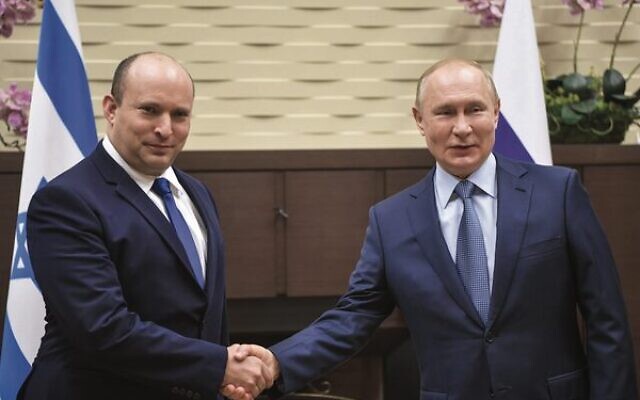Meeting one of ‘the warmest this decade’
ISRAELI Prime Minister Naftali Bennett and Russian President Vladimir Putin spoke on the phone last Saturday evening after the Israeli PM spent Shabbat in Sochi, following the leaders’ talks in the Black Sea resort town the day before.
According to the Prime Minister’s Office, Putin phoned Bennett after Shabbat ended at nightfall to thank him for the “good and in-depth meeting” on Friday.
The PM thanked Putin for hosting him and said their talks would help bolster ties between the countries, the statement from Bennett’s office said.
The PMO said Putin also invited Bennett and his wife Gilat – who did not accompany him to Sochi – to visit St Petersburg at a later date.
“The Prime Minister accepted the invitation and responded that he would be happy to come for a follow up-visit,” the statement said.
There was no statement on the phone call from the Kremlin.
Bennett had planned to return to Israel on Friday, but after his meeting with Putin ran long, he and his entourage spent Saturday in Sochi to avoid travelling on Shabbat. It was the second time Bennett – Israel’s first Orthodox prime minister – has spent an unplanned Shabbat abroad.
Bennett’s meeting with Putin was his first since taking office earlier this year.
“Russia is a very important player in our region, a kind of neighbour for us in the north,” Bennett said after the talks, referring to Russia’s large military presence in Syria.
“As such, our relationship with Russia is strategic, but also on an almost daily basis, and we need to maintain this direct and intimate discourse,” he wrote in a Facebook post. “With the Sochi beach in the background, Putin and I spoke about a wide range of issues, from his special relationship with the Jewish people to ways to deal with Islamic fundamentalism.”
Housing Minister Ze’ev Elkin, who accompanied Bennett to act as a translator and adviser, said the two held “deep” discussions on Iran’s nuclear program and a “very wide” conversation on maintaining a coordination mechanism regarding Syria, which Israel views as a key part of its air campaign against Iran-backed forces transferring weapons or trying to gain a foothold in the country.
“It was decided to keep policies vis-à-vis Russia in place [regarding airstrikes] in Syrian territory,” he said in a statement.
Elkin said the pair also discussed setting up a task force to work on allowing Russian tourists into Israel. On Thursday, Israel announced that vaccinated tourists will be allowed to enter Israel beginning November 1, but only those with vaccines approved by the World Health Organisation or United States Food and Drug Administration, which does not include Russia’s Sputnik V shot.
Elkin, a native Russian speaker who had also been a fixture in meetings between Putin and Netanyahu before breaking with the former prime minister, described the meeting as “among the warmest and most intimate held this decade,” and said the two also discussed “personal matters”.
Bennett and his entourage have appeared to try and emphasise that he and Putin were developing a personal bond. Former prime minister Benjamin Netanyahu had long argued that only his close personal ties with Putin kept the Israel-Russia relationship close, and a Russian official had earlier indicated that it would take time for the Russian leader to build the same rapport with Bennett.
The Russian President told Bennett that he hoped and expected for Israeli-Russian relations to continue smoothly.
“I truly hope that despite the internal political battles, which are unavoidable in every country, your government will pursue a policy of continuity on Russia-Israel relations,” said Putin, noting his close ties with the previous Israeli government.
In his own comments ahead of the meeting, Bennett said talks between the nations “will be based on the deep connection between the two countries. We consider you a true friend of the Jewish people.”
Some one million Russian-speakers live in Israel, with Putin having called the country a Russian outpost in the past.


comments